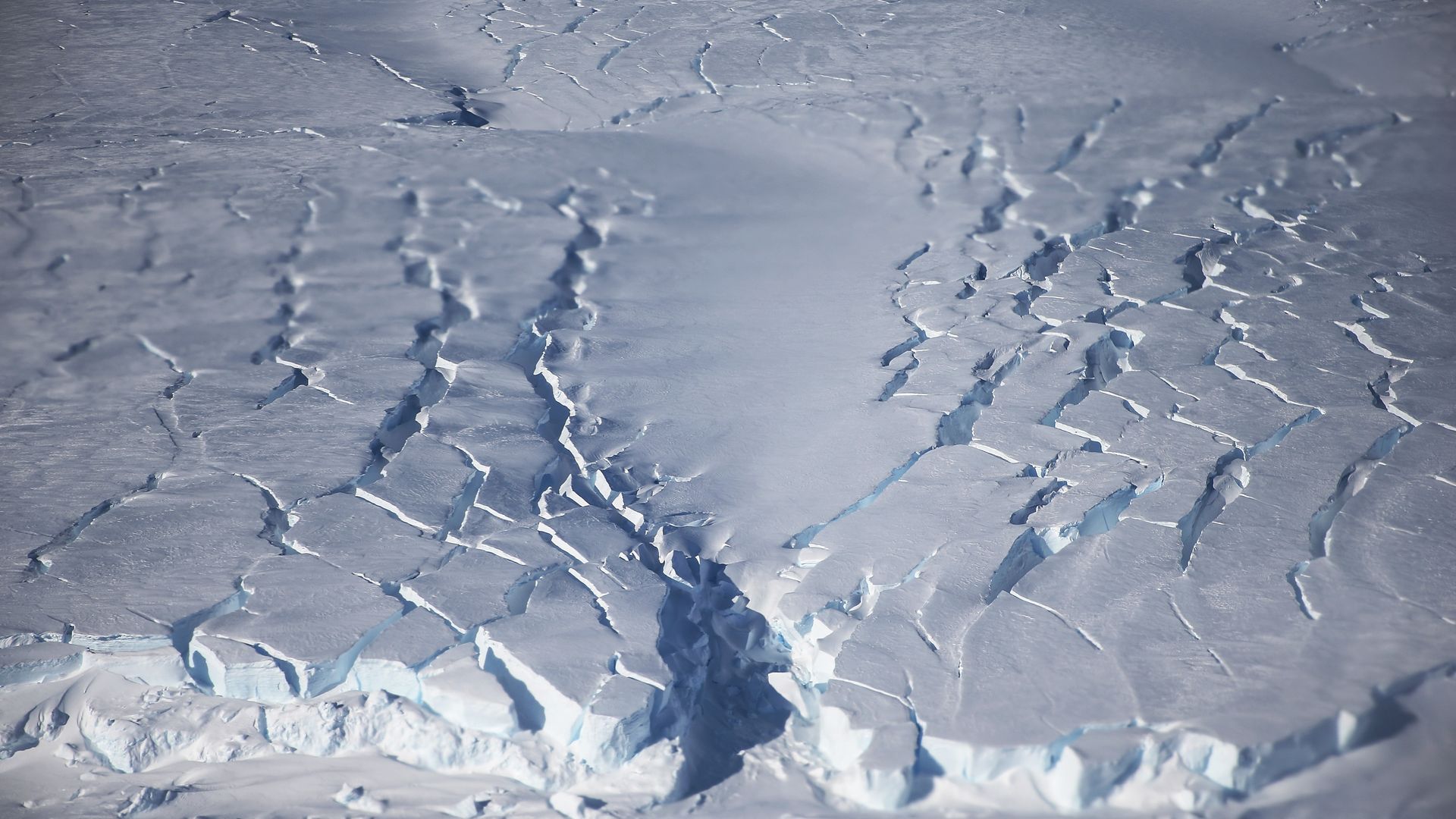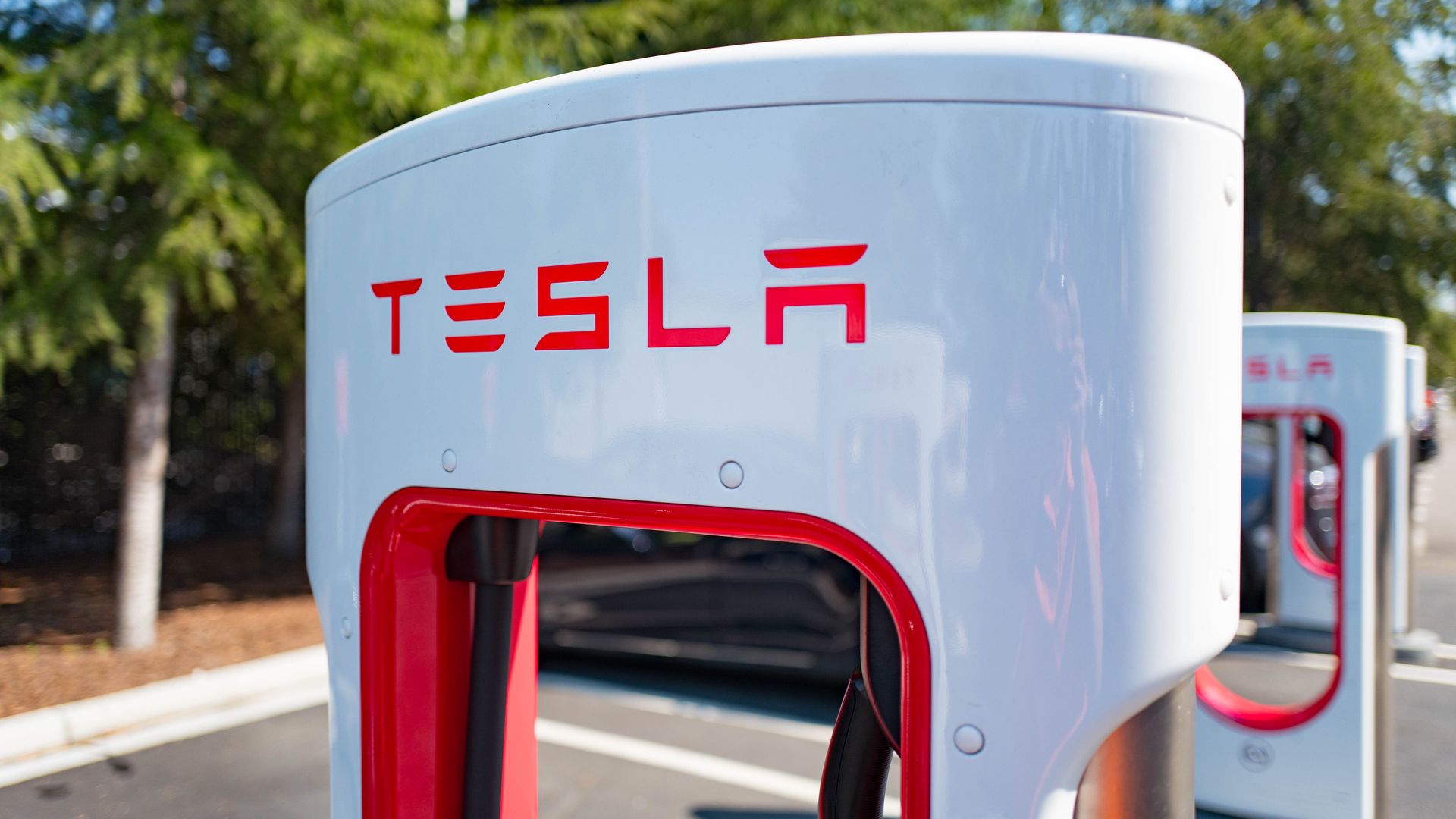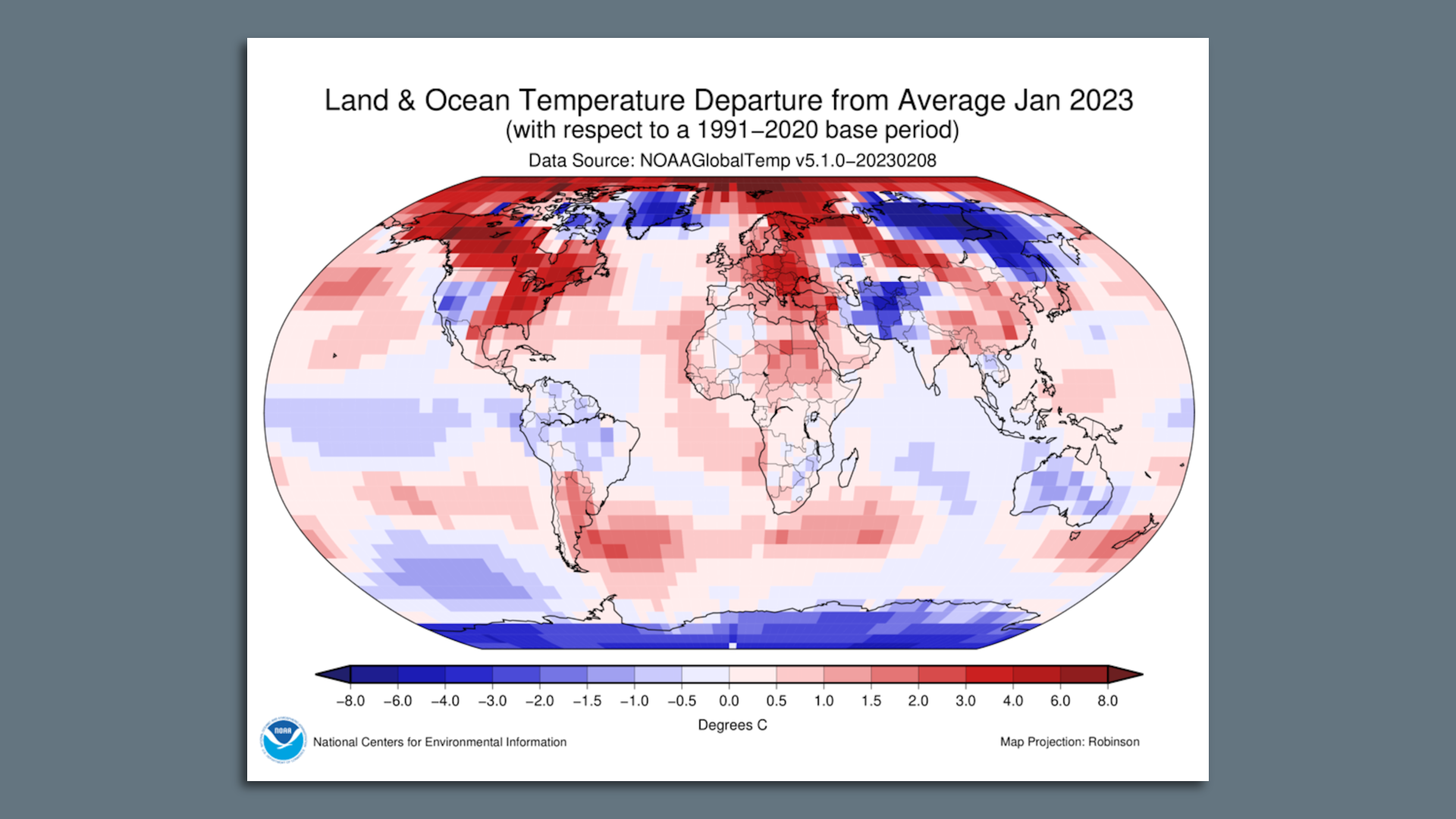| | | | | | | Presented By Panasonic | | | | Axios Generate | | By Ben Geman and Andrew Freedman · Feb 15, 2023 | | 🐪 Halfway there! Today's newsletter has a Smart Brevity count of 1,216 words, 4.5 minutes. 📬 Did a friend send you this newsletter? Welcome, please sign up. 🎶At this moment in 1970, Sly & the Family Stone were atop the Billboard singles charts with today's intro tune... | | | | | | 1 big thing: Ice sheets' long memory |  | | | Part of the West Antarctic Ice Sheet viewed from a NASA aircraft in 2016. Photo: Mario Tama/Getty Images | | | | Two new developments underscored the urgency of reducing greenhouse gas emissions, Andrew writes. Driving the news: The first was a new study published yesterday on global sea level rise. Along with extreme weather events, sea level rise is a climate change impact that is already affecting communities worldwide. - In the U.S., this comes in the form of sunny day or nuisance flooding during astronomical high tides, as well as greater coastal flooding during storm events.
- For small island developing states, sea level rise poses existential risks.
- The study, in the journal Nature Communications, found that only by limiting human-caused global warming to 1.5°C or less compared to preindustrial levels can a multi-century melting of the globe's ice sheets and increase in sea levels be averted.
- "Our simulations suggest that the worst consequences can still be avoided if we do sufficiently reduce emissions within the next decades," study coauthor Fabian Schloesser of the University of Hawaii told Axios via email.
Yes, but: Many scientists don't consider the 1.5°C target to be feasible, based on the 1.2°C of warming to date and current emissions trends. - Assuming countries' voluntary emissions pledges are met, the world is headed for about 2.4°C (4.32°F) of warming through 2100 compared to preindustrial levels, according to the Climate Action Tracker.
Threat level: The new research shows that once widespread melting of the Greenland ice sheet and large parts of Antarctica are triggered, the melting is like a runaway train. - Sea level rise would keep accelerating well beyond 2100 in many realistic warming scenarios above 1.5°C.
- The researchers used multiple simulations from computer models in which the atmosphere, ocean, ice sheets and ice shelves interact and influence one another over time.
- "According to our simulations, the 2°C warming (above the pre-industrial level) target emphasized by the Paris Agreement is insufficient to prevent accelerated sea level rise over the next century," the study states.
The intrigue: The new paper came the same day as the UN Security Council met in a novel session to discuss security risks from sea level rise. - Diplomats, including UN Secretary-General António Guterres, criticized the slow speed at which action is being taken to head off potentially catastrophic outcomes.
- They agreed that sea level rise presents humanitarian and national security concerns, as millions of people may be forced to migrate to higher ground.
- UN General Assembly leader Csaba Kőrösi of Hungary raised legal questions that sea level rise poses.
- "What happens to a nation's sovereignty — including UN membership — if it sinks beneath the sea?" he said.
|     | | | | | | 2. Tesla will open charger network to other EVs |  | | | Charger with Tesla logo at a Supercharger station in Mountain View, California. Photo: Smith Collection/Gado/Getty Images. | | | | Tesla has agreed to make part of its extensive charging network available to drivers of other brands, the White House said this morning, Ben writes. Driving the news: It will make at least 7,500 chargers nationwide available by the end of next year, per a White House summary. - At least 3,500 new and existing open-access chargers will be on highway corridors to "to expand freedom of travel for all EVs."
- Others will be at spots like "hotels and restaurants in urban and rural locations."
Why it matters: The move by the country's dominant EV player will help expand what remains limited national access to public charging. - Drivers' confidence that charging is easily accessible is important for speeding up the transition to EVs, which remain a small but growing share of sales.
The intrigue: Tesla's agreement follows "intense lobbying from the Biden administration," the Washington Post reports. - "The upgrades will allow Tesla to qualify for federal dollars" under the administration's plans to help the country have a national network of 500,000 chargers by 2030, per Politico.
Catch up fast: The news came within a wider set of White House announcements about efforts to boost charging. - They include final Transportation Department standards for chargers built using billions of federal dollars made available under the bipartisan infrastructure law.
|     | | | | | | 3. 🏃🏽♀️ Catch up fast on policy: Climate and oil |  | | | Illustration: Sarah Grillo/Axios | | | | 💵 EPA is taking initial steps to deploy $27 billion under the new climate law for emissions-cutting projects, with a focus on low-income and disadvantaged communities, Ben writes. - Driving the news: The agency released initial guidance documents for the Greenhouse Gas Reduction Fund, including a $7 billion program that will focus on community and residential solar.
- What's next: "EPA expects to open competitions for funding under the Greenhouse Gas Reduction Fund by summer 2023," the agency said. AP has more.
🛢️Alaska's senators are pressing the White House to avoid placing restrictions on ConocoPhillips' big proposed Willow project that would make it unviable, Bloomberg reports. - The intrigue: "The project creates a political challenge for President Joe Biden, who has sought to accelerate the U.S. transition away from fossil fuels while also asking American oil companies to produce more crude in the meantime in a bid to tame gasoline prices," their piece notes.
|     | | | | | | A message from Panasonic | | Driving the future of sustainable transportation | | |  | | | | As the leading electric vehicle (EV) battery manufacturer in North America, Panasonic continues to build on decades of battery expertise and technology innovation in the service of creating a greener, more equitable future. Learn how we're advancing the EV industry. | | | | | | 4. Where it stands: Russia's oil power |  Data: Federal Reserve Bank of Minneapolis; Centre for Research on Energy and Clean Air; Chart: Madison Dong/Axios Visuals Russia is a diminished but still very powerful player in global oil markets even as its revenues take a hit, Ben writes. Driving the news: Its production and exports have "held up relatively well" despite sanctions, the International Energy Agency's latest monthly outlook notes. - Russian crude exports rose in January while refined products held steady.
- Export revenues, however, were down 36% year-over-year last month as it sold barrels at a discount (the Urals grade averaged $49.48 per barrel).
What they're saying: The Minneapolis Fed posted an interview with their own Neil Mehrotra, until recently a senior Treasury Department official who help craft the G7-led price cap on Russian oil prices. - "It appears to be working in the sense that oil markets have not been significantly disrupted, and Russia appears to be collecting lower revenues than prior to the price cap," he said.
Catch up fast: It's an unusual market intervention aimed at keeping Russian barrels on global markets while trying to limit revenues for the Putin regime. - The crude cap began in December and the refined products cap just began this month.
Zoom in: Russia has been boosting shipments to India and China as the EU has banned its seaborne crude. - But Mehrotra argues the cap is indirectly affecting those transactions.
- "They have leverage now, and they're able to demand a relatively low market price for Russian oil."
Yes, but: The current $60 crude cap still enables Russia to pull in considerable revenues — intentionally so to maintain incentive to produce, he said. What's next: Later this year, if Chinese demand comes back and other economies avoid recession, "the price of oil could go up significantly and $60 could become much more of a binding target." Full interview |     | | | | | | 5. NOAA reveals revamped data for unusual January |  | | | Temperature anomalies across the globe for January 2023 compared to the 1991-2020 average. | | | | The globe had its seventh-warmest January on record since 1850, according to NOAA data released Tuesday, Andrew writes. Why it matters: The warmer-than-average January comes despite the continued cooling influence of a waning La Niña event in the tropical Pacific, demonstrating the powerful role played by human-caused greenhouse gas emissions. Zoom in: NOAA found that with the third-lowest Arctic sea ice extent in January and the lowest Antarctic sea ice extent for the month, global sea ice coverage hit a record low. - January beat the old record set in Jan. 2017 by 150,000 square miles.
- This difference is equivalent to a missing chunk of ice about the size of Montana.
Of note: This was the first global monthly report with NOAA's refined data set that goes back 30 more years, and includes much of the Arctic for the first time. |     | | | | | | A message from Panasonic | | Deepening our commitment to sustainability | | |  | | | | Panasonic is helping lead the changes necessary to address the climate crisis. Here's how: From creating more sustainable business practices, products and solutions to helping our customers integrate sustainable technologies in their projects. Learn more. | | | | 🙏 Thanks to Nick Aspinwall and David Nather for edits to today's newsletter. |  | | Your personal policy analyst is here. | | | | | | Axios thanks our partners for supporting our newsletters.
Sponsorship has no influence on editorial content. Axios, 3100 Clarendon Blvd, Arlington VA 22201 | | | You received this email because you signed up for newsletters from Axios.
To stop receiving this newsletter, unsubscribe or manage your email preferences. | | | Was this email forwarded to you?
Sign up now to get Axios in your inbox. | | | | Follow Axios on social media:    | | | | | |
No comments:
Post a Comment